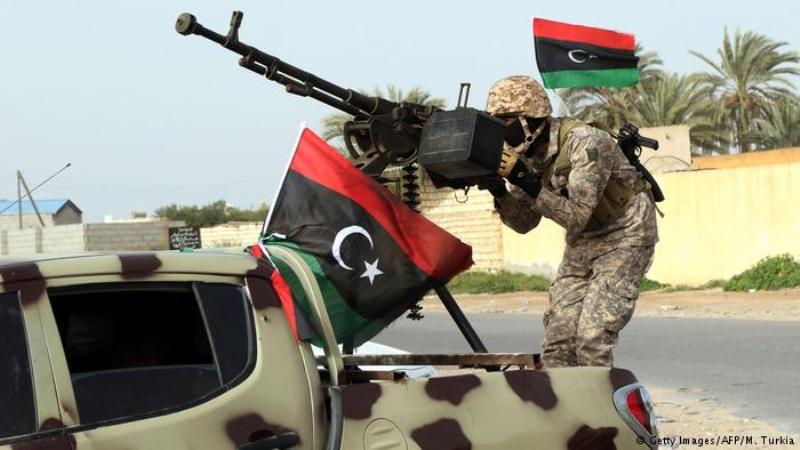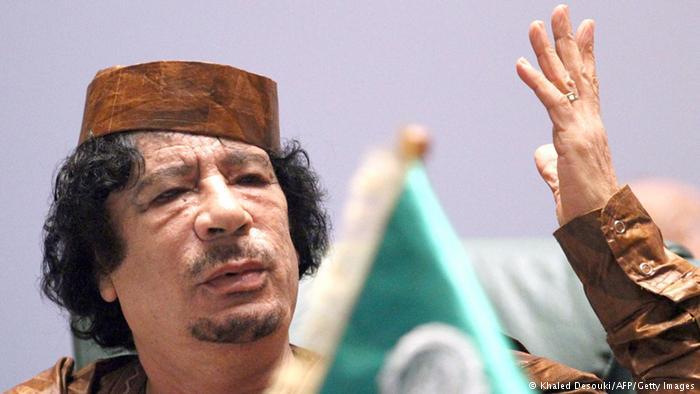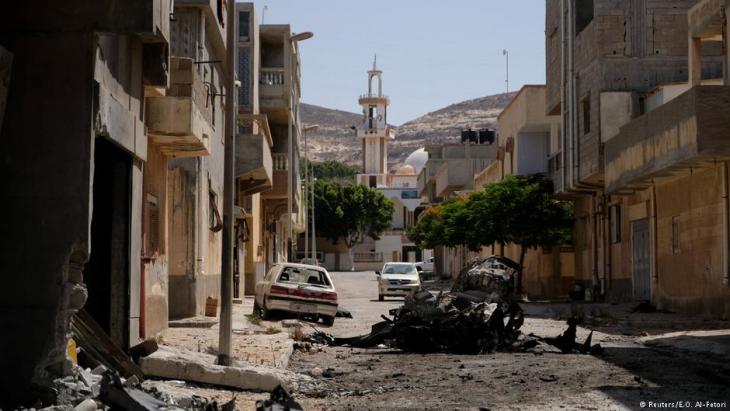Libyaʹs free for all

IS may have lost its Libyan territory, yet it is anything but certain whether the jihadists will soon be a thing of the past. And Europe's only concern when it comes to Libya is how to prevent refugees and migrants from departing from the Libyan coast and heading for Europe.
Libya is above all one thing: a disintegrating state in which two blocs are struggling to gain the upper hand: the government in Tripoli, in the western part of the country, recognised by the UN, and a self-proclaimed government under General Khalifa Haftar in eastern Benghazi.
"Libya today has two primary characteristics. It is experiencing a civil war and the collapse of the state," notes Libyan political expert Emadeddin Badi in an interview with Qantara.de, summarising the situation. "We have two governments. But neither has managed to gain control over the whole territory, or to exercise a monopoly on state power. One of the governments, based in Tripoli, has international legitimacy through the UN. But now they are being challenged internally, within the area that they supposedly control," says Badi, referring here to the fights among various militias within Tripoli in the past several weeks.
Get rid of one Gaddafi – and ten appear in his place
"We got rid of one Gaddafi and got ten Gaddafis in his place," wrote a frustrated Libyan woman on Twitter recently. For 40 years people in Libya expected something from a person, namely Gaddafi, and not from a state, Badi says. "Many people are now drawing parallels between what it was like before and what it is like today, because they are dissatisfied with the outcome of the revolution. What they don't realise is that we are still living under the same system that Gaddafi created, because nobody has ever changed it," he explains.

A way out will be hard to find, Badi continues. "The problem is that the political leaders in the country are trying to shut each other out through their policies. And that makes it difficult to bring them all together at one table."
Foreign powers including Egypt, Qatar, the United Arab Emirates are involved in the Libyan conflict. Yet Russia and the Europeans have also contributed their share to this situation, because the local conflicts in Libya are being exploited by powers outside the country for their own ends. "Everyone supports the armed group they believe will further their own influence in Libya. And the countries have divergent ideas as to how Libya can be stabilised and what it should look like in the end," notes Badi, who has been enlisted by the Carnegie Foundation to analyse the situation in Libya. "So everyone is pursuing their own interests instead of pulling together towards a common goal," he says.The recapture of territory held by "Islamic State" in Sirte, in the heart of the country, in December 2016 after months of fighting was one of the few successes to date. Meanwhile it is uncertain whether the days of IS in Libya are actually numbered. As the internal intelligence system once set up by Gaddafi has practically collapsed, there is no real capability to seriously assess the operational strength of IS, Badi points out.
The weakness of the state
"Many say that we are living in Libya in a post-IS era. Others talk about IS coming back. The problem is that the conditions that once favoured the rise of IS haven't changed," he explains. And he enumerates them: a weak state, the inability to co-operate with international organisations on counter-terrorism measures and little capacity for proper border control.
An additional problem he notes is that the groups that fought against IS in 2016 suffered great losses in the process, but were given no recognition for their efforts. Should IS become stronger once again, it would be even more difficult to mobilise internal Libyan forces against it, in part due to their fear of being weakened militarily in the inner Libyan power struggle between the two governments, he says.

The way that Europe currently sees Libya merely in terms of a transit point for migrants and refugees is a big mistake, warns Badi. The only way to reverse this trend in his view is to politically stabilise the country and to rebuild its economy so that migrants from Africa can find work again in Libya, as has traditionally been the case.
Human trafficking: a lucrative business
The attempt to shift the border of the EU to Libya and to support individual forces there in stopping migrants is a policy that is doomed to fail, of this much he is sure. As an example, Badi cites European support for the Libyan coastguard. "The problem is that the coastguard itself is involved in human trafficking. On the one hand, they receive aid from Europe so that they can pick up refugees at sea and bring them back again. But on the other hand, they also work with the smugglers, or are even active themselves. So they profit twice over," he explains.
The UN Security Council has imposed sanctions on two of the chief coastguard commanders. One of them is Abdel Rahman Milad, who commands the coastguard in Zawiya, one of its most active units, which is openly supported by the EU. This is enough to show how unsustainable this process is.
Badi does not think much of the so-called landing centres for migrants and refugees that are being discussed in Europe. "These are like just putting a plaster on a gaping wound. And I'm not always sure whether the plaster is applied on the right spot," he says, laughing loudly into the phone at this European approach. "None of the North African countries is prepared to co-operate, certainly not Libya," he is sure.
As strategically important as Libya is for Europe, most of the policy proposals miss the mark because they fail to come to terms with the realities on the ground. And this will continue to be the case as long as discussions in the capitals of Europe continue to focus on which plaster to stick where in Libya.
Karim El-Gawhary
© Qantara.de 2018
Translated from the German by Jennifer Taylor
